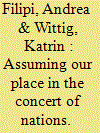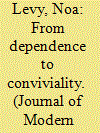|
|
|
Sort Order |
|
|
|
Items / Page
|
|
|
|
|
|
|
| Srl | Item |
| 1 |
ID:
186319


|
|
|
|
|
| Summary/Abstract |
Pierre Nkurunziza died in 2020, just a few months short of completing his tenure as the first post-civil war President of Burundi. Critics have cast him as yet another rebel-turned-politician who came to office on a promise of a democratic transformation but became progressively authoritarian, particularly during his third, disputed term in office. As a political figure, however, Nkurunziza remains poorly understood. What kind of a worldview motivated his politics? Drawing on critical discourse analysis, we identify three recurring themes in Nkurunziza's key political speeches: anti-colonialism; unity and self-sufficiency; and discourse around ‘politics of a new beginning’. These themes were stable across time, indicating Nkurunziza's consistent worldview, but became more pronounced and radical as he faced growing challenges to his legitimacy from within and without. Far from being confined to rhetoric, the themes also manifested in concrete policy decisions, underscoring the urgent need to take ideology seriously in understanding the political trajectories of African leaders.
|
|
|
|
|
|
|
|
|
|
|
|
|
|
|
|
| 2 |
ID:
186315


|
|
|
|
|
| Summary/Abstract |
Why do elections in some ethnically diverse constituencies resemble an ethnic census, while in others ethnicity plays a less prominent role? Prior literature on ethnic bloc voting in Africa suggests that political parties acquire ethnic ‘labels’ that tacitly signal which groups belong to the party. In ethnic census-style elections, voters and politicians then use ethnicity as a heuristic for deciding which party to support. However, ethnic censuses are not the only possible outcome in diverse constituencies. Links between ethnic identities and political parties can create a disconnect between locally and nationally relevant identities that affects the dynamics of local elections. Drawing on data from over 160 semi-structured, qualitative interviews and detailed election results in four ethnically diverse Kenyan parliamentary constituencies, I show how local constructions of ethnic difference mediate the effects of national political dynamics and shape patterns of political competition in parliamentary elections, affecting the behaviour of politicians and voters.
|
|
|
|
|
|
|
|
|
|
|
|
|
|
|
|
| 3 |
ID:
186316


|
|
|
|
|
| Summary/Abstract |
Unaccompanied child and youth migrants negotiate with local host communities in their attempts to find a place to belong to, yet research has generally neglected their participation in the making of relationships with the people around them. Providing a perspective of the longue durée, the Zimbabwean–South African borderland teaches us that time is critical in young migrants’ ability to negotiate their positioning and actively shape relationships with host communities, based on mutual interest. While at the beginning of their stay, unaccompanied children and youth were at the mercy of others, time enabled them to accumulate knowledge and develop skills that were in demand, shifting their place in society and setting the ground for conviviality.
|
|
|
|
|
|
|
|
|
|
|
|
|
|
|
|
| 4 |
ID:
186317


|
|
|
|
|
| Summary/Abstract |
Tax compliance is a major concern as states try to increase state revenues in order to provide services for their populations. Remarkably, taxation has not figured centrally on the agenda among scholars working on the African voter. This article contributes through studying the social practice of taxes, by asking: how is taxation understood as a political practice? This is studied using focus groups across the private and public sector in Namibia, where the willingness to pay taxes and the relative tax burden is high. This micro-study of citizens’ experiences focuses on the perceived room for political practice in relation to taxes, sense of influence over taxes and whether taxes are thought about in citizenship terms. The article shows that taxes are relegated to a sphere of politics where deliberation and opportunities for accountability are missing, yet ideas of duty are central elements of tax compliance.
|
|
|
|
|
|
|
|
|
|
|
|
|
|
|
|
| 5 |
ID:
186318


|
|
|
|
|
| Summary/Abstract |
Over the past decade, hundreds of youth leadership initiatives have been established globally with the mission of grooming a new generation of leaders. This paper examines this largely unstudied and rapidly expanding leadership pipeline based on an ongoing study, which has collected data on 277 programmes that: target African youth, offer educational training or professional development, and have goals of cultivating leaders who will contribute to African development; and interviewed and surveyed 240 youth participants. Our purpose is twofold: (1) we offer an overview of the organisational approaches of these initiatives, which reveal a global ecosystem within and beyond Africa that is investing billions of dollars into youth leadership. Then, using case studies of the African Leadership Academy and University, and the Young African Leadership Initiative, (2) we ask what their tendency toward elite-driven strategies, corporate leadership models, and foreign collaboration may indicate about their larger politics and likely impact.
|
|
|
|
|
|
|
|
|
|
|
|
|
|
|
|
|
|
|
|
|